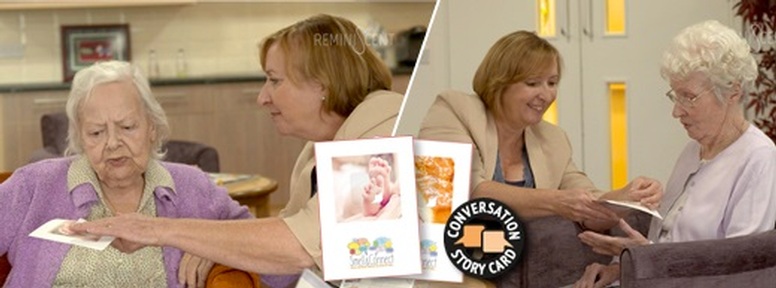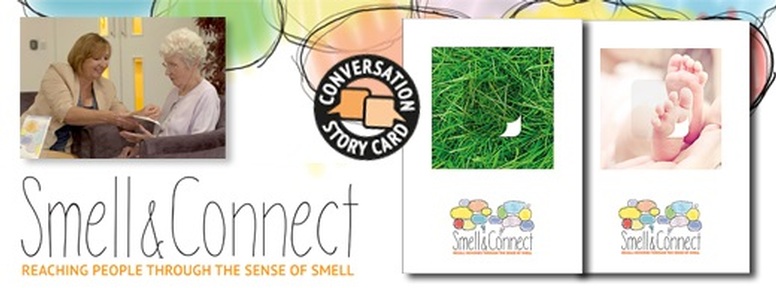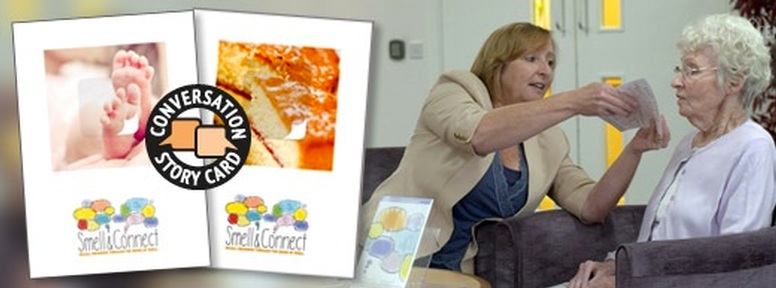ReminiScent cards evoke memories and stimulate conversation for those living with dementia
The sense of smell is the most immediate and emotional of the senses; rooted in the parts of the brain responsible for evoking memory and emotion. Whether positive or negative, this exchange results in a connection that makes a difference to how people feel about themselves, their situation and their relationships.
With this in mind, ReminiScent Ltd recently launched an innovative range of Smell & Connect cards, which have been designed to ‘reach people through scents’ and engage those living with Alzheimer’s disease and dementia in conversation and activities.

ReminScent’s communications director Linda Harman has revealed the reason behind the launch of the cards. She said: “I was working in the fragrance industry four years ago when my father died and I found myself suddenly thrown into caring for my mother, who has dementia.
“When I took my mother to attend Sensory Therapy at our local hospital, I was amazed to see that the sense of smell was hardly used. It has such strong connection to memory and feelings that I was sure a vital tool was missing from the therapist’s armoury.
“I left the fragrance industry at the beginning of this year, tested the idea in local care homes and was encouraged to bring Smell & Connect to the market.”
The power of smell in dementia care
Previous research has suggested that the relevance of sensory therapy, particularly in person-centred care, is that the act of sharing a scent experience automatically engages people in a joint activity.
Commenting on how ReminiScent cards support older people living with dementia, Ms Harman continued: “As cognitive function declines, the part of the brain that processes feelings remains active – meaning that, whilst people may not recall the facts of an occasion, they will retain the feelings created.
“Smell & Connect uses scent combined with images and text to create an activity that can be enjoyed on many different levels. Even if the only indication of a reaction is a smile, the empathy generated through the shared activity is invaluable. People with dementia are extremely aware of how we interact with them. Taking a moment to enjoy a favourite smell together, to talk about past times and comment on the images can really affect the mood of a relationship.
“Keeping relationships strong, whether they be with family or professionals, is also vital to helping people live well with the condition. Scent and touch therapy have added to my mother’s quality of life; lavender gently scents her room to reduce anxiety and promotes sleep and relaxation. It also helps to create a personal space in the care home where she now lives.”

Smell & Connect cards stimulate conversation
Smell & Connect cards currently feature six distinctive scents with key words and suggested talking points for carers. Each card is also accompanied by a conversation story on the reverse to help stimulate conversation and evoke memories.
The smells are selected to reflect happy life experiences; the smell of cut grass for memories of outdoors, of fresh air, and of the first summer cut of lawns; the smell of baby powder to evoke memories of newborns.
Ms Harman believes that "people inevitably respond to these smells with a smile - and usually, a flood of suggestions as to what this smell means to them."
Yet, she has suggested that the cards work most effectively when they are used by friends, family members or carers on a one-to-one or small group basis.
“One of the powerful things about the cards is that they build upon the very familiar concept of conversation cards. Therefore, they can be used at any time and not be confined to organised activity sessions.
“Kept to hand, the cards can also be used to help deflect repetitive behaviour, reducing stress for both the carer and resident.
"In one care home, a resident who had been feeling despondent was cajoled into joining a smelling session. The smell of baby powder reminded her of when she used to nurse premature babies; she fondly recounted how small they used to be and moved from feeling angry to smiling," she added.
‘The response to scent is fast’

Smell, like taste, is a chemical sense that is detected by sensory cells called chemoreceptors. When airborne molecules stimulate the olfactory receptor cells in the nose, they pass electrical impulses to the brain, which are interpreted as a specific odour.
Noting the response stages to smell, Ms Harman continued: “The response to a scent is so fast that there are two distinct stages; the first is an immediate awareness of the odour that tells us whether it is pleasant or not.
“The second response stage is a more considered one, as we analyse the smell to identify what it is. This is a very individual process as smell more than any other sense is intimately linked to the parts of the brain that process emotion and associative learning. This means that a smell will evoke a feeling and a memory of the place or time.”
The two-stage process makes it sense effective in helping to connect with people at all dementia stages. For some, smelling could lead to detailed conversations, for others, a scent will bring a moment of pleasure through the sensation and engagement with their carer, friend or relative.
According to research conducted by Alzheimer’s Society, a reduction in smell awareness could be a potential indicator of Alzheimer’s disease. However, it is debatable whether the study identifies a reduced ability to smell or a reduced ability to identify an odour.
Ms Harman added: “If it is the latter, this is not surprising given the nature of the disease and known decline in cognitive ability. In our research, scent cards have stimulated a reaction in most people on at least the like/don’t like basis and the activity has provided a means of helping people to feel included which supports their well-being as a whole."
The future of Reminiscence
Commenting on her future hopes for the Smell & Connect cards, Ms Harman concluded: “Without my mother I would not have had the opportunity to learn how valuable a smile that has been unlocked by scent is, particularly to families that are coping with dementia.
“I hope that we will be able to develop our range to include a whole library of scent cards. There will be something for everyone; to unlock memories of sporting success, private moments, holidays or a favourite place or person.”
For more information about ReminiScent and the Smell & Connect cards, visit: http://smellandconnect.co.uk/.
Latest Features News
 25-Nov-19
2019 Election: Boris Johnson leaves social care in 'too difficult box' but Labour vows to end 'crisis'
25-Nov-19
2019 Election: Boris Johnson leaves social care in 'too difficult box' but Labour vows to end 'crisis'
 18-Oct-19
Podcast: Wendy Mitchell and dementia: 'My biggest fear is not knowing who my daughters are'
18-Oct-19
Podcast: Wendy Mitchell and dementia: 'My biggest fear is not knowing who my daughters are'
 27-Sep-19
Exclusive: Care minister backs care workers' call for time off to grieve and attend funerals
27-Sep-19
Exclusive: Care minister backs care workers' call for time off to grieve and attend funerals
 19-Sep-19
Podcast: Gyles Brandreth says poetry helps ward off dementia
19-Sep-19
Podcast: Gyles Brandreth says poetry helps ward off dementia
 30-Aug-19
Edinburgh Fringe funnyman joins comics facing toughest audience at care home gig
30-Aug-19
Edinburgh Fringe funnyman joins comics facing toughest audience at care home gig